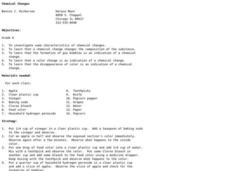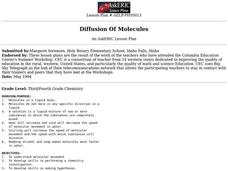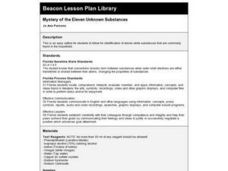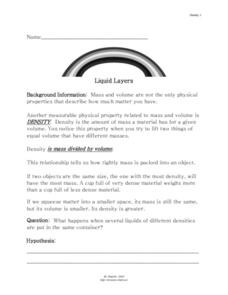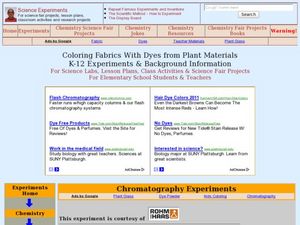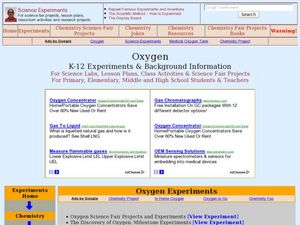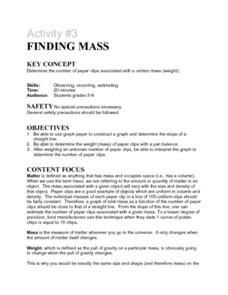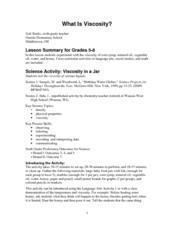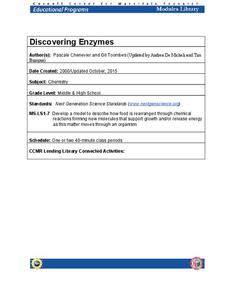Curated OER
Chemical Changes
Sixth graders explore chemical and physical changes. In this lesson about chemical changes, 6th graders observe various items and changes that occur at certain times. Students determine what change took place and observe the change....
Curated OER
Root, Root, Root for the Nutrients
Pupils observe the growth of a seed, predict what will happen when seeds are planted without soil, and conduct an experiment using a hydroponics system.
Curated OER
Diffusion Of Molecules
Students investigate molecular movement while studying how to perform a chemistry investigation.
Curated OER
Chemical Changes
Students explore chemical changes. in this activity about the properties of chemical changes, students do experiments, observe, and record results. Students complete four experiments in order to observe chemical changes. In each...
Curated OER
Mystery of the Eleven Unknown Substances
Fourth graders identify eleven white substances that are commonly found in the household. They, in pairs, perform experiments on a variety of substances, and must identify them based on the reactions they observe.
Curated OER
Volume Lab
How can we find volume if it a shape isn't easy to measure? Investigate methods for determining this as the volume of regular and irregular objects is explored in several stations. Learners discover that when the standard formula for...
Curated OER
Indicator Sponge A Discrepant Event Demonstration
Students explore the use of acid and base pH indicators. The teacher saturates an indicator sponge with congo red solution. Afterwards, the sponge is placed in a blue base solution. Students observe that the blue sponge actually turns...
Curated OER
Liquid Layers
In this density worksheet, students investigate what will happen when various liquids with different densities are put into the same container. They hypothesis and make observations. Students answer 4 questions about their investigation...
Curated OER
Coloring Fabrics With Dyes from Plant Materials K-12 Experiments & Background Information
Students investigate the effects of acid and bases on dyes made with plant materials. In this chromatography lesson students predict color outcomes and complete a lab activity on color combinations.
Curated OER
Activity #7 Apple Color Change
Students compare the different rates of reaction between an apple covered with vitamin C and an apple with no vitamin C. They compare the different rates of reaction between an apple placed in the sun and one not exposed to the sun. ...
Curated OER
Classification of Changes
In this classification of changes worksheet, students identify each example as either chemical or physical changes. Students also classify other examples as either element, compound, solution, colloid, or suspensions. In the other...
Curated OER
Oxygen
Students explore oxygen and its physical and chemical propeties. In this investigative lesson students complete several experiments using oxygen.
Curated OER
Activity #9 Tye Green Blob
Students comprehend that a chemcial change produce substances with a different composition and physical and chemcial properties. They state the differences between physical and chemical changes. Pupils observe changes that occur during...
Curated OER
Sour Acids and Bitter Bases
Students explore acids and bases. They experience the sour taste of acids and the bitter taste of bases by tasting substances such as chocolate, lemon juice, and baking soda. in addition, they complete a worksheet for individual assessment.
Curated OER
Activity #3 Finding Mass
Students use graph paper to construct a graph and determine the slope of a straight line. They determine the weight (mass) of paper clips with a pan balance. Pupils weigh an unknown number of paper clips, and to interpret the graph to...
Curated OER
Condensation and the Water Cycle
Students explore the natural distallation process that occurs in the water cycle. They use plastic cups and cotton swabs to observe the condensation process that is evident in the water cycle.
Curated OER
Snowflake Bentley
Learners explore crystals through the story Snowflake Bentley and then create crystal pictures of their own. In this interdisciplinary lesson, they create a crystal web chart on chart paper, design artificial snowflakes, and write poems...
Curated OER
Parallel Structure Practice
Practice parallel structure with a multiple-choice exercise. Twenty questions challenge learners of all ages to correctly fill in blanks with phrases that are parallel in structure to what is already there. Tip: As noted, this worksheet...
Teach Engineering
Edible Algae Models
Sometimes it's okay to eat your science experiment. A hands-on activity has pupils create models for algae to learn about its cellular structure. The best part of the experiment? The resulting juice-filled gels are edible—yum!
Polar Trec
What Is My Footprint?
How do one's habits and lifestyle choices affect the environment? Through a short online survey, learners will calculate their own carbon footprints then determine how to reduce their impact on the environment through simple steps, such...
Exploratorium
Your Sense of Taste
A simple and sweet activity shows students how important smell is in interpreting flavor. Pairs of pupils hold their noses and eat Life Savers®, only to find that they can't identify the flavors until they let go. You will appreciate...
Beyond Benign
SLS Toxicology Test
Ingredients in your shampoo are toxic enough to kill plants. The 16th installment of the series of 24 tests the toxicity level of various concentrations of SLS, a chemical found in nearly all shampoo. Learners prepare percent solutions...
Curated OER
What Is Viscosity?
Students experiment with the visocosity of corn syrup, mineral oil, vegetable oil, water, and honey. They research viscosity before beginning. Pupils draw the conclusion that the marble sinks more slowly in the liquids with greater...
Cornell University
Discovering Enzymes
Explore the function of enzymes through a series of lab investigations. Learners use household enzymes such as hydrogen peroxide to model the role of enzymes. The enzymes break down proteins with and without a catalyst.
Other popular searches
- 4th Grade Food Chemistry
- Food Chemistry Pdf
- Food Chemistry Quiz
- Food Chemistry Pancakes
- Food Chemistry Protein
- Food Chemistry Detection
- Food Chemistry Mcq
- Food Chemistry Pd
- Food Chemistry Cakes
- Food Chemistry Protien
- Food Chemistry Mc
- Food Chemistry Pancackes
